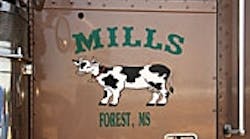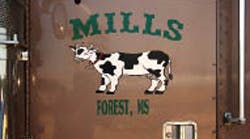QUINTON Mills spent virtually his entire life as a milk hauler and Mississippi dairy farmer. Overall, it has been a very good career that has spanned nearly five decades.
His fleet operation, Mills Trucking, hauls milk and other liquid foods throughout the Southeast and even serves some customers as far west as Texas. The fleet is based at Mills' dairy farm in Hillsboro, Mississippi.
“I've been involved in milk hauling and dairy farming virtually my entire life,” Mills says. “My father was in the dairy business, and I followed in his footsteps. This has been a great business even though we've seen quite a bit of consolidation in dairy farms in recent year.
“We used to collectmilk from 50 dairy farms in the Hillsboro area, but just eight remain today. Currently, we run about 900 head of cattle on our farm and milk about 500. That makes us probably the largest dairy farm in the area. We've also seen steady growth in our truck fleet operation, and we're very optimistic about the future for that part of our business.”
Britt Crowell, Mill's son in law and a partner in the family business, adds that the trucking operation is a solid performer that has achieved very good growth. “We believe that Mills Trucking is a good size for the market that we currently serve,” he says. “However, we're ready to grow with the right expansion opportunities.”
Niche operator
Mills Trucking has built a solid niche for itself as a regional fleet running 10 tractors and 11 trailers. Six of the trailers are milk tankers, and five are walking floor feed trailers. In addition to milk, the tank trailers are used for other liquid foods, including juices.
Trucking was a key focus for Mills from the very beginning. He started what became Mills Trucking in 1959 and bought his first bobtail with a 2,300-gallon milk tank in 1961. At the time, Mills was hauling milk from the dairy farms in Hillsboro to a co-op in Jackson, about 53 miles west of Hillsboro.
“At first, I lived in Jackson and made the run to Hillsboro every day,” Mills says. “In 1962, I bought land in Hillsboro and started running about 100 milk cows. I built a barn on the property in 1966, and moved my entire operation there.”
Even as Mills established his own dairy farm operation, the milk hauling side of the business was evolving. He purchased his first single-axle milk tanker in 1963 and added the fleet's first tandem-axle tanker in 1968. A truck-and-trailer milk transport followed in 1973.
“As our trucking activity grew, we needed tanks that could haul more product,” Mills says. “That drove our move to bigger equipment. “By the 1980s, we no longer operated bobtails, and we bought our first two 6,000-gallon milk trailers. They were some of the largest in the area at the time. We bought 6,500-gallon trailers in 1989, and that remains our standard size today.”
Maximizing cargo capacity was part of an overall strategy to provide customers with the best possible service. Mills trucking hauls milk seven days a week for its dairy customers. The trucking company employs four fulltime drivers and three to four part-time drivers.
“Our customers know that they can count on us to keep running regardless of weather or operating conditions,” Crowell says. “Milk production doesn't stop just because of bad weather, and we can't, either. As long as the farms keep milking, we continue collecting and hauling. We keep at it, and get it done.”
Crowell acknowledges that the Southeast presents some challenging operating conditions during various times of the year. “Ice storms and snow during the winter create treacherous driving conditions on narrow roads in the rural areas where we operate,” he says. “We also face the challenges of hurricanes and tornadoes.”
Mills Trucking hauls three to five loads of milk a day to dairy plants in the region. Most of those loads come from the eight dairy farms that remain active in the Hillsboro area. A few loads come from Texas and other locations outside Mississippi.
Local milk
The Mills dairy farm generates a load a day on its own, according to Mills. The other dairy farms around Hillsboro are smaller and usually are served every other day. Batches often must be combined from several of the smaller farms to fill a trailer.
“We want to haul about 48,000 pounds of milk with each trailer load,” Mills says. “We've always made a point of running legal weights.”
Most of the loads go to dairy plants in Mississippi, but Mills Trucking also serves milk processors in Alabama, Kentucky, and Tennessee. Most trips are within a 300-mile radius of Hillsboro.
While milk consumption has fallen somewhat over the past year, there is still plenty of demand in the Southeast. Processing plants in the 10-to-11 states that make up the region take in around 300 loads of milk a day, and that is 365 days a year.
Food loads
While milk dominates the focus at Mills Trucking, the carrier has transported a diverse range of cargoes over the years. The fleet has hauled cream, orange juice, condensed milk, buttermilk, and vinegar.
“We'll haul anything foodgrade,” Crowell says. “Recent hauls have included muscadine grape juice used to make wine. We haul the grade juice from vineyards in south Georgia to wineries in Georgia and Tennessee. We also haul drinking water after hurricanes. At one time, Mills Trucking even ran a few refrigerated trailers that were used to transport cottage cheese.”
Animal feed also keeps Mills Trucking busy. The fleet started out hauling cattle feed just for the Mills dairy farm operation. However, it wasn't long before the carrier was hauling feed for other farms in the Hillsboro area. Today, Mills Trucking serves a growing number of customers with its five walking-floor feed trailers.
“Soybean and cotton seed meal account for most of the feed shipments,” Mills says. “A majority of feed shipments come out of mills in north Mississippi, but we haul some loads from mills in Memphis (Tennessee) and Decatur (Alabama). Our feed customers include farms, feed mills, and co-ops in Alabama, Georgia, Florida, Louisiana, and Mississippi.”
Reliable fleet
Keeping edibles shipments on schedule calls for a reliable fleet. Mills Trucking has standardized on Freightliner tractors due to good availability of parts and service. The newest tractors in the fleet are Columbia conventional with 72-inch sleepers.
“We buy new tractors and used units with very low mileage,” says Freddy Ledford, another Mills son-in-law and partner in the business. “We prefer Detroit Diesel engines and Fuller nine- and 10-speed transmissions. We run our tractors at least 700,000 miles before replacement.”
Most of the six milk tankers were built by Walker Stainless Equipment Co and were purchased through Semo Tank/Baker Equipment Co. “Walker builds a very durable tank,” Ledford says. “Semo Tank/Baker Equipment is our primary source of trailer parts, and they have reworked several of our tankers.”
The 6,500-gallon stainless steel sanitary tanks are insulated and mounted on a carbon steel full-length frame. Tanks are specified with a clean-in-place system and two-inch stainless steel Jabsco pump.
Running gear includes Reyco spring suspensions. “We prefer spring suspensions because they hold up well,” Ledford says. “They just need proper maintenance.”
Most of the routine maintenance for the tractors and trailers is handled in-house. Most components — engines being a notable exception — are rebuilt by the fleet's mechanics. ♦











